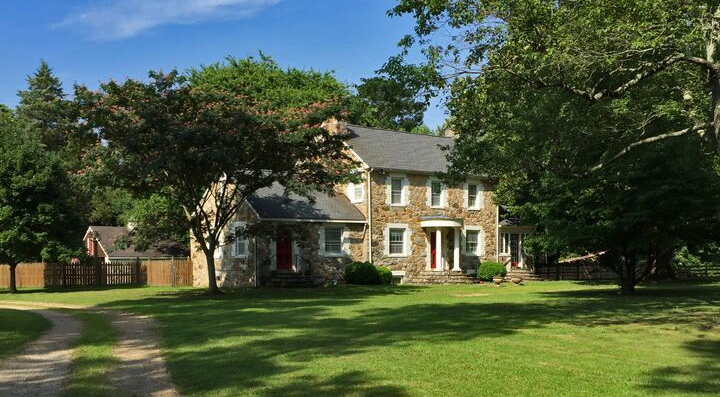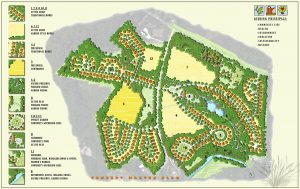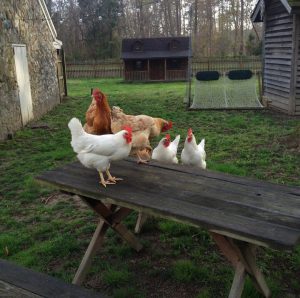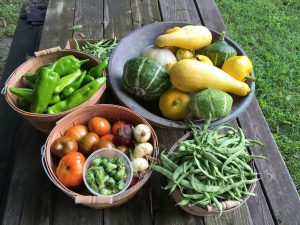
A 100-year-old home sits on a Hanover site proposed for a residential development. Photos courtesy of Jon Beckner.
A developer’s proposal for a former family farm in Hanover County would encourage retirees and other residents to swap their golf clubs for gardening tools.
Roger Glover of Cornerstone Homes is proposing a 300- to 400-home development that would blend suburban living with organic farming, as opposed to a golf course or other rec-centered amenity. The community, called Chickahominy Falls, would be developed on about 150 acres along Holly Hill Road just south of Cedar Lane.
The property includes the former homestead of the family of Frank Hargrove Sr., a former longtime member of the Virginia House of Delegates.
Glover, whose Cornerstone Homes targets the 55-and-up homebuyer demographic, said Chickahominy Falls would be targeted to retirees, as well as to millennials who like the idea of community-based farming.
The community would be anchored by a staffed, working farm that residents could support – a concept called “community-supported agriculture” that Glover said is novel to the Richmond area.
“We’re trying to become probably the first community in the greater Richmond area to combine a working organic farm under a CSA arrangement within the immediate development,” Glover said. “And also set it up to where it becomes a functioning, integral, exciting part of all of Hanover County.”
Glover is working with Matthew “Quint” Redmond of Colorado-based Agriburbia, which integrates farming into new and existing developments. Glover reached out to Redmond after researching the concept and conceptualizing the community with Jon Beckner, a Joyner Fine Properties agent who lives on the property and is brokering the land deal.
“I wanted to integrate something more than bocce ball, shuffleboard and a pool and a clubhouse,” Glover said. “I say that a little tongue-in-cheek, because that’s what I’ve done for years, and it’s been very effective in pulling people together and a great way for especially retirees to socialize. What I was looking for was something even greater.”
Beckner, who maintains a garden and a flock of chickens on the property, said it is conducive to the farming community concept. He said the land’s soil was previously used for agriculture, and it has ponds that cascade into the Chickahominy River, which borders the southern end of the site.
“It was not a big agricultural operation,” Beckner said. “It was mainly cattle, goat and chickens and gardening for the folks that lived there back then. They lived off of it.”
The homestead also features a historic stone house and outbuildings. Beckner said the Hargrove family has owned the property since just after the Civil War and the house was built in the early 20th century to replace an earlier house that was lost in a fire.
The 150-acre site consists of multiple parcels under different ownerships. Several are owned by members of the Hargrove family or a family trust, Woodside LLC.
Glover said the parcels needed for the project are currently under contract. The family-owned parcels, totaling about 60 acres, were most recently assessed by Hanover County at a collective value of more than $1 million.
Glover declined to discuss the projected cost of the development or how it would be financed. Cornerstone Homes would be the developer and builder.
Other firms involved with the project include transportation engineering firm Ramey Kemp & Associates, engineering and surveying firm The Bay Cos., and Stewart/H&G landscape architects. Andy Condlin, an attorney with Roth Doner Jackson, is representing Cornerstone on the project.
Glover said 75 percent of the homes would be targeted to retirees, while the rest would be targeted to millennials and first-time homebuyers.
“I want to make it possible for multiple people of different backgrounds, especially the seniors and the millennials, to be able to come together and enjoy all the amenities we’ll have on this site, and especially partake in the organic farming operations and the healthy food that will come with that,” Glover said.
Glover and Redmond said the combination of residents, as well as agricultural activities, would be conducive to educational opportunities and partnerships that they said would benefit the Hanover community at large.
“One of the things that produces real communities is to produce something together, as opposed to recreate together,” Redmond said. “Many of the 55-plus folks in the country are realizing that they like to recreate and play golf once or twice a week, but the other days they really like to be productive into their later years.
“A lot of the older people know how to do things – they know how to can; they know how to make applesauce – and there’s no (better) place for that transfer of knowledge, because there’s going to be a generational component here, hopefully,” Redmond said.
Glover said he is aiming to file a rezoning request with the county within a month. Should the county approve the project, he said development could start about a year from now and be complete within four to five years.
He said homes would likely range from 1,600 and 1,700 square feet to upwards of 3,000 square feet. He said prices could start in the mid- to high-$200,000s. Most floor plans would have first-floor master bedrooms and other features targeted to older homebuyers.
Glover said his goal in bringing Redmond into the project is to make sure the farming component is more than just a marketing device. He said similar communities, such as Willowsford in Ashburn, have shown him the concept can prove successful. In King William County, the historic Seven Springs estate is being converted into an events venue and farm for a rare breed of sheep.
“The first challenge is to make sure that what we build here isn’t a sideshow, so to speak, to the development,” he said. “I want it to be an integral part of our community and an integral part of Hanover County.
“I wanted something that wasn’t just there to sell the community. I want it to make the lives of the people better and to have legs that will last a long time.”

A 100-year-old home sits on a Hanover site proposed for a residential development. Photos courtesy of Jon Beckner.
A developer’s proposal for a former family farm in Hanover County would encourage retirees and other residents to swap their golf clubs for gardening tools.
Roger Glover of Cornerstone Homes is proposing a 300- to 400-home development that would blend suburban living with organic farming, as opposed to a golf course or other rec-centered amenity. The community, called Chickahominy Falls, would be developed on about 150 acres along Holly Hill Road just south of Cedar Lane.
The property includes the former homestead of the family of Frank Hargrove Sr., a former longtime member of the Virginia House of Delegates.
Glover, whose Cornerstone Homes targets the 55-and-up homebuyer demographic, said Chickahominy Falls would be targeted to retirees, as well as to millennials who like the idea of community-based farming.
The community would be anchored by a staffed, working farm that residents could support – a concept called “community-supported agriculture” that Glover said is novel to the Richmond area.
“We’re trying to become probably the first community in the greater Richmond area to combine a working organic farm under a CSA arrangement within the immediate development,” Glover said. “And also set it up to where it becomes a functioning, integral, exciting part of all of Hanover County.”
Glover is working with Matthew “Quint” Redmond of Colorado-based Agriburbia, which integrates farming into new and existing developments. Glover reached out to Redmond after researching the concept and conceptualizing the community with Jon Beckner, a Joyner Fine Properties agent who lives on the property and is brokering the land deal.
“I wanted to integrate something more than bocce ball, shuffleboard and a pool and a clubhouse,” Glover said. “I say that a little tongue-in-cheek, because that’s what I’ve done for years, and it’s been very effective in pulling people together and a great way for especially retirees to socialize. What I was looking for was something even greater.”
Beckner, who maintains a garden and a flock of chickens on the property, said it is conducive to the farming community concept. He said the land’s soil was previously used for agriculture, and it has ponds that cascade into the Chickahominy River, which borders the southern end of the site.
“It was not a big agricultural operation,” Beckner said. “It was mainly cattle, goat and chickens and gardening for the folks that lived there back then. They lived off of it.”
The homestead also features a historic stone house and outbuildings. Beckner said the Hargrove family has owned the property since just after the Civil War and the house was built in the early 20th century to replace an earlier house that was lost in a fire.
The 150-acre site consists of multiple parcels under different ownerships. Several are owned by members of the Hargrove family or a family trust, Woodside LLC.
Glover said the parcels needed for the project are currently under contract. The family-owned parcels, totaling about 60 acres, were most recently assessed by Hanover County at a collective value of more than $1 million.
Glover declined to discuss the projected cost of the development or how it would be financed. Cornerstone Homes would be the developer and builder.
Other firms involved with the project include transportation engineering firm Ramey Kemp & Associates, engineering and surveying firm The Bay Cos., and Stewart/H&G landscape architects. Andy Condlin, an attorney with Roth Doner Jackson, is representing Cornerstone on the project.
Glover said 75 percent of the homes would be targeted to retirees, while the rest would be targeted to millennials and first-time homebuyers.
“I want to make it possible for multiple people of different backgrounds, especially the seniors and the millennials, to be able to come together and enjoy all the amenities we’ll have on this site, and especially partake in the organic farming operations and the healthy food that will come with that,” Glover said.
Glover and Redmond said the combination of residents, as well as agricultural activities, would be conducive to educational opportunities and partnerships that they said would benefit the Hanover community at large.
“One of the things that produces real communities is to produce something together, as opposed to recreate together,” Redmond said. “Many of the 55-plus folks in the country are realizing that they like to recreate and play golf once or twice a week, but the other days they really like to be productive into their later years.
“A lot of the older people know how to do things – they know how to can; they know how to make applesauce – and there’s no (better) place for that transfer of knowledge, because there’s going to be a generational component here, hopefully,” Redmond said.
Glover said he is aiming to file a rezoning request with the county within a month. Should the county approve the project, he said development could start about a year from now and be complete within four to five years.
He said homes would likely range from 1,600 and 1,700 square feet to upwards of 3,000 square feet. He said prices could start in the mid- to high-$200,000s. Most floor plans would have first-floor master bedrooms and other features targeted to older homebuyers.
Glover said his goal in bringing Redmond into the project is to make sure the farming component is more than just a marketing device. He said similar communities, such as Willowsford in Ashburn, have shown him the concept can prove successful. In King William County, the historic Seven Springs estate is being converted into an events venue and farm for a rare breed of sheep.
“The first challenge is to make sure that what we build here isn’t a sideshow, so to speak, to the development,” he said. “I want it to be an integral part of our community and an integral part of Hanover County.
“I wanted something that wasn’t just there to sell the community. I want it to make the lives of the people better and to have legs that will last a long time.”



Hopefully Hanover will decide to invest in improvements to traffic flow as well as the schools in the western side of the County at some point in the near future. If they continue to approve re-zoning requests for additional housing and large commercial developments like the coming outlet mall, surely SOME of the resulting tax revenue could be used to repair and upgrade the old, crumbling schools, and add a few badly needed traffic signals…
Amen! The western end of the county does not have the infrastructure yet for this development. And for once I’d like to see the schools, like Patrick Henry, get some long-overdue attention and funding. It’s disheartening as a taxpayer whose child went to the outdated and overcapacity Patrick Henry to see the multi-million dollar, under-capacity Hanover High, where the lower student-teacher ratio results in higher test scores, etc. Unfortunately it doesn’t seem like there’s true educational equality in Hanover county’s western side. That has nothing to do with the quality of Patrick Henry’s staff; they are outstanding. But statistics show… Read more »
Patsy, I completely agree, my kids go to PH and some of my good friends teach there. They’re doing the best they can with what they’re being given, but the building is over 50 years old, overcrowded, and falling apart. As are Beaverdam and Henry Clay elementary schools. South Anna elementary has been using trailers to handle overcrowding for ten years now, with no plans for new construction or even major upgrades for these schools being discussed. One of my teacher friends at PH had to discard an entire classroom worth of supplies and books that were covered in mold… Read more »
Please put us on the waiting list.